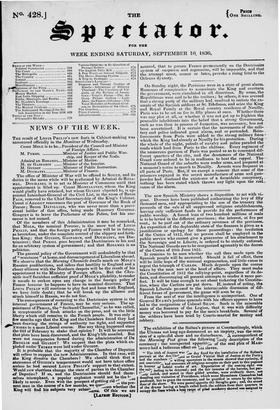On Sunday night, the Parisians were in a state of
great alarm. Rumours of conspiracies to assassinate the King and overturn the government, were circulated in all directions. By some, the Republicans were said to be the traitors; by others, it was averred that a strong party of the military had resolved to imitate the ex- ample of the Spanish soldiers at St. Ildefonso, and seize the King and Royal Family at the Royal country residence of Neuilly. Paris was to be set on fire in fifty places at once. Whether there was any plot at all, or whether it was not got up to frighten the peaceable inhabitants into the belief that a strong Government, such as was then in process of formation, was necessary, has not been ascertained. It is certain that the movements of the mili- tary and police indicated great alarm, real or pretended. Rein- • forcements from Paris were added to the strong military force ‘. which the King had already at Neuilly for his protection. During - the whole of the night, patrols of cavalry and police paraded the roads which lead from Paris to the chfiteau. Every regiment of the numerous garrison of Paris was posted so as to command dif- ferent quarters of the city, and the drummers of the National Guard were ordered to be in readiness to beat the rappel. The - National Guard of the suburbs were under arms, and prepared at a moment's notice to march to Neuilly. Arrests were frequent in all parts of Paris. But, if we except a rumour that some of the - prisoners engaged in the secret manufacture of arms and gun- , powder had disclosed the existence of a formidable conspiracy,. nothing has been stated which throws any light upon the real- cause of the alarm.


























